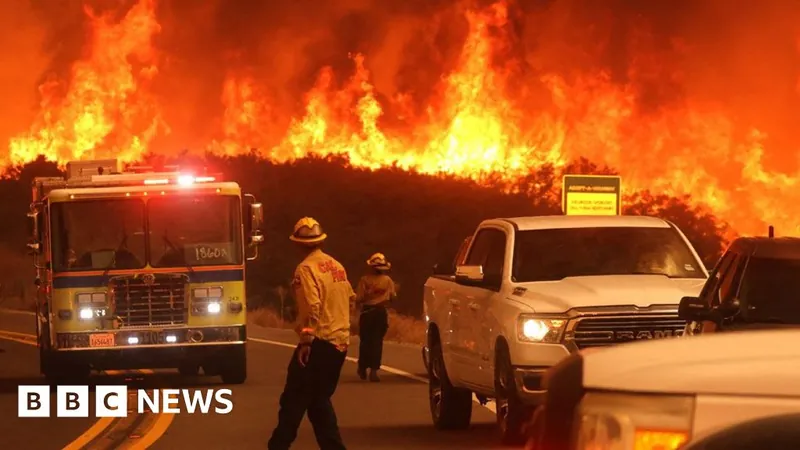
COP29: The High-Stakes Climate Conference in Azerbaijan You Can't Afford to Ignore!
2024-11-09
Author: Jia
As the world grapples with a rapidly changing climate, COP29, the 29th annual Conference of the Parties convened by the United Nations, is taking center stage from November 11 to 22 in Baku, Azerbaijan. The stakes couldn't be higher as leaders from various nations seek to devise strategies to curb devastating climate impacts – many of which have rocked parts of Europe, like the recent catastrophic floods in Spain that left destruction in their wake.
What's at Stake This Year?
This year’s meeting aims to strengthen financial commitments for developing nations, allowing them to tackle their greenhouse gas emissions and adapt to the escalating challenges posed by climate change. However, the atmosphere is overshadowed by geopolitical tensions, including the aftermath of the recent U.S. elections, where the climate-skeptical Trump administration's return ushered in uncertainty, complicating the global dialogue.
Notably, several key figures will be absent, including U.S. President Joe Biden, China's Xi Jinping, and France's Emmanuel Macron. Their no-shows raise concerns about the conference's momentum, as important discussions about climate financial aid and cooperative measures may lose urgency without their leadership. As Prof. Thomas Hale from Oxford University noted, "No world leader is arriving with climate change at the number one spot in their inbox."
What Does COP Stand For?
COP stands for "Conference of the Parties," referring to nearly 200 countries that have ratified the United Nations Framework Convention on Climate Change (UNFCCC) established in 1992. This pivotal gathering allows nations to negotiate and reaffirm their commitments to combat the underlying causes of climate change.
Key Discussions: Finance, Policy, and Fossil Fuels
Money is a hot topic at COP29. Under the Paris Agreement of 2015, nations pledged to limit global temperature increases to below 1.5°C. Achieving this target necessitates increased funding aimed at supporting emerging economies in reducing their carbon footprints and preparing for climate impacts. Rich countries are under pressure to agree on a new financial benchmark that would allocate over $1 trillion annually for climate finance by 2030, a figure actively pursued by vulnerable countries like small island nations and those in Africa.
Big players, however, are hesitant; negotiations around whether nations classified as developing economies, such as China and some Gulf States, should contribute more remain contentious.
Baku: Controversial Host
The choice of Azerbaijan as the host city for COP29 has raised eyebrows. As the country plans to boost gas production significantly over the next decade, concerns arise about its commitment to reducing reliance on fossil fuels. Reports indicate that Azerbaijanian officials may leverage the climate conference to attract investments for their national oil and gas sector, aggravating critics who point to the country’s poor human rights record.
The Ripple Effect of U.S. Politics
Trump's victory is felt at COP29, casting doubt over the future of U.S. climate policy. Although Biden's administration will advocate for continued progress toward climate goals, any agreements reached now lack binding power for a potential Trump-led future. The fear that the U.S. could retract its commitments to the Paris Climate Agreement looms large.
Why Now, More Than Ever?
This year's climate narrative is dire, with warnings suggesting that 2024 is poised to become the hottest year on record, exacerbated by extreme weather events across the globe, including powerful hurricanes in the U.S. and devastating floods in Europe. Experts emphasize that every year of inaction translates to rising temperatures and broader climate repercussions.
The Broader Impact on You
The outcomes of COP29 will shape global economic policies and may directly influence energy prices. Similarly, the commitment of wealthier nations to finance climate initiatives impacts taxpayers and affects how resources are allocated toward reducing the world’s carbon footprint.
In conclusion, COP29 represents a crucial juncture in international climate dialogue. The outcomes have the potential to forge a path toward a sustainable future or result in setbacks that could reverberate for generations. Stay tuned, because the decisions made in Azerbaijan may very well dictate the health of our planet for years to come!



 Brasil (PT)
Brasil (PT)
 Canada (EN)
Canada (EN)
 Chile (ES)
Chile (ES)
 España (ES)
España (ES)
 France (FR)
France (FR)
 Hong Kong (EN)
Hong Kong (EN)
 Italia (IT)
Italia (IT)
 日本 (JA)
日本 (JA)
 Magyarország (HU)
Magyarország (HU)
 Norge (NO)
Norge (NO)
 Polska (PL)
Polska (PL)
 Schweiz (DE)
Schweiz (DE)
 Singapore (EN)
Singapore (EN)
 Sverige (SV)
Sverige (SV)
 Suomi (FI)
Suomi (FI)
 Türkiye (TR)
Türkiye (TR)